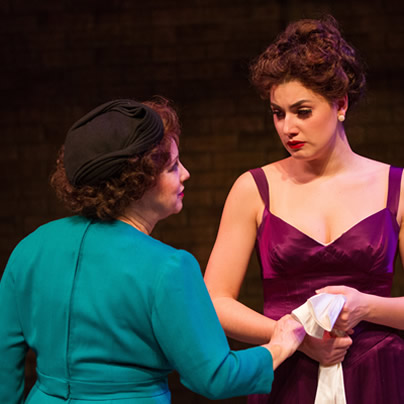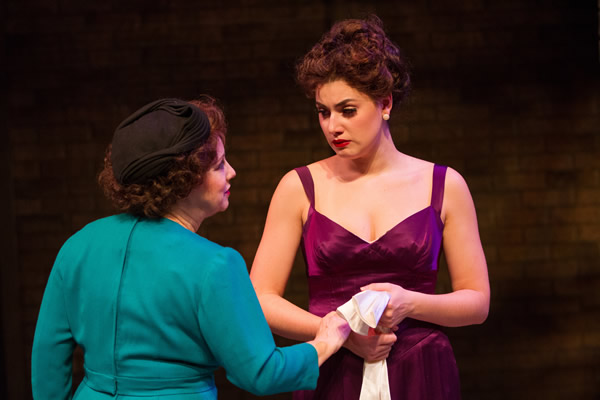Arts & Entertainment
A ‘Rose’ by any other name
Theater vet Edelen tackles iconic stage mom role in ‘Gypsy’


Sherri L. Edelen, left, as Momma Rose, and Maria Rizzo as Louise in ‘Gypsy,’ playing now at Signature Theatre. (Photo by Teresa Wood; courtesy Signature)
‘Gypsy’
Through Jan. 26
Signature Theatre
4200 Campbell Ave. Arlington
$40-99
703-820-9771
Ferocious is how director Joe Calarco describes “Gypsy’s” Momma Rose, the unstoppable stage mother who’ll do whatever it takes to make her kids stars.
Probably the most formidable woman’s part in musical theater history, Rose is frequently compared to Shakespeare’s Lear and playing her has been likened to climbing Mount Everest twice. Those who’ve tackled the part include Ethel Merman, Angela Lansbury, Bernadette Peters and more recently Patti LuPone. And now it’s local actor Sherri L. Edelen’s turn to take on the iconic role at Signature Theatre in a production staged by Calarco.
Who plays Rose always prompts discussion. To do it right requires a terrific voice, acting skills and comedic flair. And while Edelen won’t be scrutinized in the same way Broadway names inevitably are, comparisons will be made. Affable and smart, Edelen isn’t bothered: “Everyone sees how difficult and complex this woman is to play and they want to see if the actress can rise to the challenge. I let go of comparisons long ago. Every actress is different, so comparisons make no sense, really.”
But Edelen doesn’t dismiss the significance of the gig. Playing Rose is a big deal and she knows it. Until Calarco brought it up, she never thought she’d do the part. When Edelen was younger, she looked for the kind of supporting comic roles that she does so wonderfully, like the inn keeper’s unscrupulous wife in Signature’s “Les Misérables,” a superb performance for which she deservedly won a Helen Hayes Award. But as she got a little older, Edelen took on parts (and triumphed in) leading roles like Mrs. Lovett in Signature’s “Sweeney Todd” and as Margaret Johnson in “Light in the Piazza” with the Philadelphia Theatre Company. But still, Rose scared her: “She is fierce. She uses up all the energy in my body to inhabit her mind. And like those who play Lear, or any Shakespearean role really, the exploration will continue until closing and on until the next actress picks up Rose.”
“Gypsy” follows the rise of legendary stripper Gypsy Rose Lee. Set in the ‘20s, it’s an incredible backstage story featuring Momma Rose and young daughters June and Louise (later Gypsy) who criss-cross the country in pursuit of fame and fortune. The mother of all stage mothers, Rose will stop at nothing to make her girls stars on the dying Vaudeville circuit. When June quits the act, Momma focuses her suffocating attentions on the less talented Louise.
With a sensational score boasting a thrilling overture and standards like “Everything’s Coming Up Roses,” “Some People,” “Together (Small World)” and Momma’s 11th hour cri de coeur “Rose’s Turn,” “Gypsy” is routinely named by many critics to be the best Broadway musicals ever. Based loosely on Gypsy Rose Lee’s bestselling memoir, “Gypsy” premiered on Broadway in 1959. It’s the creation of true musical theater titans: Jule Styne (music), Stephen Sondheim (lyrics) and Arthur Laurents (book). Sondheim is gay, as was Laurents who died in 2011 at 93.
During an interview for the Blade in 2004, Laurents shared an anecdote. Initially when asked to write a musical based on Gypsy Rose Lee’s bestselling biography, he wasn’t interested. But not long afterward he heard some gossip at a party. Reportedly Gypsy’s mother had had affairs women and once threw a hostile hotel manager from a fifth floor window. Laurents took the assignment. And while the musical would be called “Gypsy” for contractual reasons, it’s always really been about Rose. She’s the show’s driving force.
“I wish I had one ounce of her drive and confidence,” Edelen says. “I think playing her has made me more confident, more of a fighter for my own ideals. No one believes in her dream like she does: Not Herbie (Rose’s boyfriend). Not her children. Not anyone. She has no support system but herself really and yet she has the strength and belief in herself to carry on.”
Signature’s artistic director Eric Schaeffer already had Edelen in mind when he made “Gypsy” a part of this year’s season. He never thought of bringing in a New York actor for the part. “We always wanted to do it with someone local. The talent pool here has gotten better and better, and we didn’t need to look beyond Washington. We’d done it before with Donna (Donna Migliaccio played Rose in Signature’s 2001 “Gypsy,” and plays the plum part Mezeppa the brassy stripper who bumps it with a trumpet in the current production) and it was time to give someone else the opportunity.”
Calarco, who’s worked with Edelen on eight shows, says she was ready to play Rose. In addition to having the voice, she understands comedy and is a great actress with a deep well from which to draw.
“If anyone can find the reason why Rose is so ferocious, it’s Sherri. She can explore that. Though it’s a musical, we play it like a play, focusing on Rose’s relationships with Herbie and daughter Louise (played here by Mitchell Hébert and Maria Rizzo, respectively).”
Rose isn’t much for introspection. As she sees it, she’s the ultimate loving mother doing her best to give her kids a fabulous life.
“I don‘t see Rose as a monster, the stage mother from hell, or a show off,” Edelen says. “I wanted to delve into why she operates the way she does, what is motivating her to behave the way she does. Only then can her vulnerability break through. … We all have joys and sorrows that shape us. Hopefully, if your readers come see the show, they can learn that she is vulnerable, just like everybody else and then you can understand what motivates her. Mr. Laurents tells you in his script and hands it to the audience on a silver platter, if they are listening.”
Television
ICYMI: ‘Overcompensating’ a surprisingly sweet queer treat
A sweet, savvy show about breaking free to embrace your true self

Pride month 2025 is now behind us, and while it’s safe to say that this year’s celebrations had a darker edge than usual, it’s also true that they came with a particularly rich bounty of new queer movies and shows to entertain us – so many, in fact, that even if we are facing a lull until the fall another harvest of fresh content, there are still plenty of titles – which, for whatever reason, were off your radar – for you to catch up on in the meantime.
One of the most notable of these – the bingeworthy series “Overcompensating” (now streaming on Amazon Prime) – will most definitely have been ON the radar for the plentiful fans of creator and star Benito Skinner, the actor/comedian who rose to viral fame through his content on platforms like Instagram, YouTube, and TikTok. For anyone else, it might have easily slipped through the cracks.
Created and written by Skinner as a loosely autobiographical “college comedy,” it aims for the kind of raucous, explicitly sexed-up tone one expects from the genre as it centers on Benny (Skinner), newly arrived as a freshman at prestigious Yates University. A former football jock and “golden boy” at his midwestern high school, he’s the picture of idealized youthful masculinity; he’s also deep in the closet, struggling to keep his sexuality hidden and maintain his macho front under the intense scrutiny of the college’s social scene – and under the resentful eye of his older sister Grace (Mary Beth Barone), who has already secured her own place at the top of the pecking order.
In the first episode, Benny’s difficulties are eased when he meets Carmen (Wally Baram), another freshman trying to navigate the politics of college life; a gamer from a home marred by tragedy, she’s an outsider who feels like she’s putting on an act, too, and they click – giving him the convenient “cover” of female companionship while providing them both with much-needed support and encouragement. He’s also befriended by a handsome film major from England (Rish Shah), who has already caught his eye, stirring other kinds of feelings and possibly even reciprocating them. Meanwhile, he’s being courted by the school’s “exclusive secret society” – headed by his sister’s aggressively “alpha” boyfriend Pete (Adam DiMarco) – and trying to stay interested in his studies, despite a growing realization that a career in business doesn’t actually appeal to him all that much.
That’s a lot to juggle for anybody, even an overachiever like Benny – whose “lucky” life so far has largely been the result of playing a role he is finding harder and harder to maintain. As the series goes on through its eight-episode arc, it becomes clear that he’s not the only one who is “keeping up appearances,” and he, along with the other confused and damaged young people in his orbit, begins the painful (but often hilarious) process of evolution that is required in order to become truly oneself.
Directed toward appealing to a younger demographic, “Overcompensating” is the kind of show that requires a few episodes worth of invested time to make an impression that feels like substance. Full of the bawdy farcical antics that go hand in hand with stories about hormonally charged college kids, it’s not above leaning into the formulas and tropes that have always driven these kinds of comedies. At first, while its broadly comedic strokes and frequently explicit sexual hijinks might elicit plenty of chuckles, the show might easily feel tiresome for more mature audiences; there’s a nostalgic fun to it, made even more appealing, somehow, by the “political incorrectness” of its frequently sexist and homophobic humor, but for a while things may feel like an unnecessary attempt to reinvent “Animal House” for the Gen Z crowd.
By the time the season reaches its halfway point, however, things have started to get real. The antics of these horny almost-adults take on a more pointed absurdity, informed by the increasingly tangled web of defensive deceit they weave among themselves – and, as things draw toward a cliffhanger climax, the consequences of maintaining it – until it achieves a sense of empathy toward them all. There’s a wisdom that smacks of lived authenticity underlying the whole affair, transforming it from the “sexploitative” teen comedy of its surface into something deeper. To be sure, things stay expectedly wacky, and the soap-operatic melodrama of its twists and reversals continue to maintain the show’s “mature YA” appeal; but beneath those trappings, by the end of the season a truer identity has begun to emerge, just as its characters have begun to find their own levels of self-actualization for themselves.
As creator, primary writer, and star, it’s obviously Skinner who deserves much of the credit. While it might be tempting, early on, to dismiss the show as an “ego project,” the internet-spawned sensation proves his talents quickly enough to get past such judgy suspicions, delivering a pitch-perfect blend of sauciness and sensitivity that extends its appeal toward both ends of the taste spectrum; just as crucially, he brings the same aforementioned “lived authenticity” to his winning performance – after all, he’s essentially playing himself in a fictionalized version of his own life – while also making sure that equal time (and compassion) is afforded all the other characters around him, each of whom are pushing at the boundaries of their own respective “closets,” too. It’s unavoidable to notice that – like most of his co-stars – he’s plainly a decade too old to be playing a college student; but by the time we reach that crucial halfway turning point, we’ve become too engaged by him to care.
The show is full of excellent performances, in fact. Relative newcomers Baram and Barone offer layers of complex nuance, while the more familiar DiMarco (“White Lotus”) is close to heartbreaking as the toxic BMOC clinging to the illusion of power as his life begins unraveling around him. Other standouts include the mononymic actress Holmes as Carmen’s “wild child” roommate, solidly likable turns as Benny’s parents from mature veterans Connie Britten and Kyle MacLachlan (whose presence, along with stylish elements in several key scenes, hints at an homage-ish nod to the late David Lynch), and podcaster Owen Thiele as an openly gay fellow student who has Benny “clocked” from the moment they meet. Finally, Lukas Gage makes a deep impression as a former high school teammate at the heart of Benny’s most haunting memory.
There’s no official word yet on whether “Overcompensating” will be renewed for a second season, despite the multiple loose ends left dangling at the end of its first; it has proven to be popular, and Skinner’s large fanbase makes it likely that the story will continue. Even if it doesn’t, the place of uncertainty in which it has left its characters rings true enough to serve as a satisfying endpoint.
As for us, we hope that won’t happen. For all its sophomoric humor, generic plot twists, and purposefully gratuitous sexual titillation, it’s one of the sweetest, kindest, and most savvy shows we’ve seen about breaking free from conformity to embrace your true self – and that’s a message that applies whether you’re queer, straight, or anywhere in between.
Photos
PHOTOS: Independence Day Weekend in Rehoboth
Wicked Green Pool Party, fireworks among festivities

Vacationers and residents alike enjoyed Independence Day Weekend activities in Rehoboth Beach, Del. The Wicked Green Pool Party drew hundreds to the CAMP Rehoboth fundraiser on Saturday. That evening, revelers went to the rooftops to watch the fireworks display.
(Washington Blade photos by Daniel Truitt)













Music & Concerts
Red, White, and Beyoncé: Queen Bey takes Cowboy Carter to D.C. for the Fourth of July
The legendary music icon performed on July 4 and 7 to a nearly sold-out Northwest Stadium.

Just in time for Independence Day, Beyoncé lit up Landover’s Commanders Field (formerly FedEx Field) with fireworks and fiery patriotism, bringing her deeply moving and genre-defying “Cowboy Carter” tour to the Washington, D.C. area.
The tour, which takes the global icon across nine cities in support of her chart-topping and Grammy-winning country album “Cowboy Carter,” landed in Prince George’s County, Maryland, over the Fourth of July weekend. From the moment Beyoncé stepped on stage, it was clear this was more than just a concert — it was a reclamation.
Drawing from classic Americana, sharp political commentary, and a reimagined vision of country music, the show served as a powerful reminder of how Black Americans — especially Black women — have long been overlooked in spaces they helped create. “Cowboy Carter” released in March 2024, is the second act in Beyoncé’s genre-traversing trilogy. With it, she became the first Black woman to win a Grammy for Best Country Album and also took home the coveted Album of the Year.
The record examines the Black American experience through the lens of country music, grappling with the tension between the mythology of the American Dream and the lived realities of those historically excluded from it. That theme comes alive in the show’s opening number, “American Requiem,” where Beyoncé sings:
“Said I wouldn’t saddle up, but
If that ain’t country, tell me, what is?
Plant my bare feet on solid ground for years
They don’t, don’t know how hard I had to fight for this
When I sing my song…”
Throughout the performance, Beyoncé incorporated arresting visuals: Black cowboys on horseback, vintage American iconography, and Fox News clips criticizing her genre shift — all woven together with voiceovers from country legends like Dolly Parton and Willie Nelson. The result was a multimedia masterclass in storytelling and subversion.
The “Cowboy Carter” tour has been a social media sensation for weeks, with fans scrambling for tickets, curating elaborate “cowboy couture” outfits, and tailgating under the summer sun. At Commanders Field, thousands waited in long lines for exclusive merch and even longer ones to enter the stadium — a pilgrimage that, for many, felt more like attending church than a concert.
One group out in full force for the concert was Black queer men — some rocking “denim on denim on denim on denim,” while others opted for more polished Cowboy Couture looks. The celebration of Black identity within Americana was ever-present, making the concert feel like the world’s biggest gay country-western club.
A standout moment of the night was the appearance of Beyoncé’s 13-year-old daughter, Blue Ivy Carter. Commanding the stage with poise and power, she matched the intensity and choreography of her mother and the professional dancers — a remarkable feat for someone her age and a clear sign that the Carter legacy continues to shine.
It’s been nearly two decades since Beyoncé and Destiny’s Child parted ways, and since then, she’s more than lived up to her title as the voice of a generation. With “Cowboy Carter,” she’s not just making music — she’s rewriting history and reclaiming the space Black artists have always deserved in the country canon.
-

 Federal Government2 days ago
Federal Government2 days agoTreasury Department has a gay secretary but LGBTQ staff are under siege
-

 Virginia3 days ago
Virginia3 days agoDefying trends, new LGBTQ center opens in rural Winchester, Va.
-

 District of Columbia2 days ago
District of Columbia2 days agoGay GOP group hosts Ernst, 3 House members — all of whom oppose Equality Act
-

 Opinions4 days ago
Opinions4 days agoUSAID’s demise: America’s global betrayal of trust with LGBTQ people












